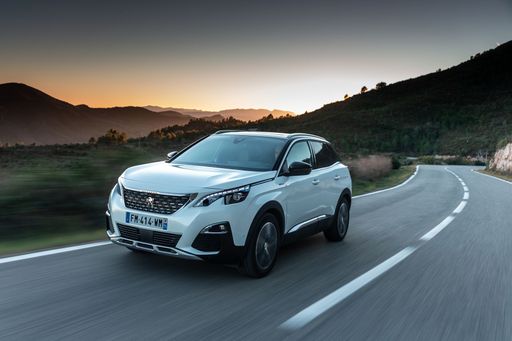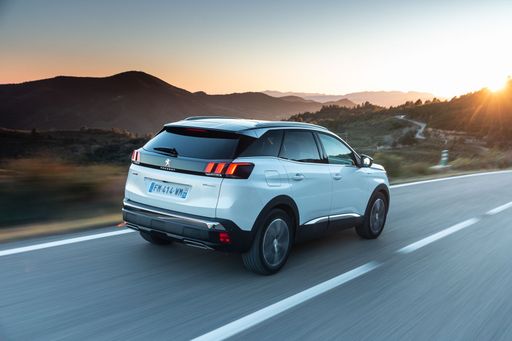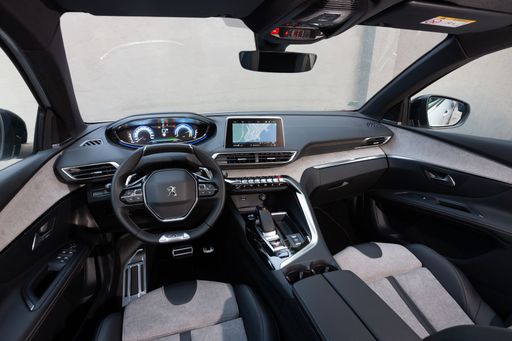Peugeot 3008 vs Toyota C-HR - Differences and prices compared
Costs and Efficiency:
Looking at overall running costs, both models reveal some interesting differences in everyday economy.
Toyota C-HR has a clearly perceptible advantage in terms of price – it starts at 29100 £, while the Peugeot 3008 costs 35100 £. That’s a price difference of around 6008 £.
Fuel consumption also shows a difference: Toyota C-HR manages with 0.80 L and is therefore decisively more efficient than the Peugeot 3008 with 2.40 L. The difference is about 1.60 L per 100 km.
As for range, the Peugeot 3008 performs decisively better – achieving up to 698 km, about 630 km more than the Toyota C-HR.
Engine and Performance:
Power, torque and acceleration are the classic benchmarks for car enthusiasts – and here, some clear differences start to show.
When it comes to engine power, the Peugeot 3008 has a noticeable edge – offering 325 HP compared to 223 HP. That’s roughly 102 HP more horsepower.
In acceleration from 0 to 100 km/h, the Peugeot 3008 is distinct quicker – completing the sprint in 6 s, while the Toyota C-HR takes 7.40 s. That’s about 1.40 s faster.
In terms of top speed, the Peugeot 3008 performs slightly better – reaching 220 km/h, while the Toyota C-HR tops out at 180 km/h. The difference is around 40 km/h.
Space and Everyday Use:
Whether family car or daily driver – which one offers more room, flexibility and comfort?
Seats: offers more seating capacity – vs .
In curb weight, Toyota C-HR is barely noticeable lighter – 1505 kg compared to 1648 kg. The difference is around 143 kg.
In terms of boot space, the Peugeot 3008 offers to a small extent more room – 520 L compared to 447 L. That’s a difference of about 73 L.
In maximum load capacity, the Peugeot 3008 performs clearly perceptible better – up to 1480 L, which is about 325 L more than the Toyota C-HR.
When it comes to payload, Peugeot 3008 slight takes the win – 467 kg compared to 425 kg. That’s a difference of about 42 kg.
Who comes out on top?
Overall, the Peugeot 3008 shows itself to be outperforms in nearly all aspects and secures the title of DriveDuel Champion.
It convinces with the more balanced overall package and proves to be the more versatile choice for everyday use.
 @ Peugeot / Stellantis Media
@ Peugeot / Stellantis Media
Peugeot 3008
Costs and Consumption
View detailed analysis
Engine and Performance
View detailed analysis
Dimensions and Body
View detailed analysis
Peugeot 3008
The Peugeot 3008 blends bold French styling with a surprisingly grown-up interior that makes even dull commutes feel a little bit special. Practical enough for family life yet lively to drive, it’s a clever all‑rounder that stands out from the crossover crowd without shouting for attention.
details @ Peugeot / Stellantis Media
@ Peugeot / Stellantis Media
 @ Peugeot / Stellantis Media
@ Peugeot / Stellantis Media
 @ Peugeot / Stellantis Media
@ Peugeot / Stellantis Media
 @ Peugeot / Stellantis Media
@ Peugeot / Stellantis Media
Toyota C-HR
The Toyota C-HR cuts a striking figure with its angular styling and coupe-like profile, so you’ll never go unnoticed in the supermarket car park. It balances everyday practicality with a nimble, city-friendly personality, making routine commutes feel a touch more fun without asking for forgiveness.
details @ Toyota Motor Corporation
@ Toyota Motor Corporation
 @ Toyota Motor Corporation
@ Toyota Motor Corporation
 @ Toyota Motor Corporation
@ Toyota Motor Corporation
 @ Toyota Motor Corporation
@ Toyota Motor Corporation
 @ Toyota Motor Corporation
@ Toyota Motor Corporation
 @ Peugeot / Stellantis Media
@ Peugeot / Stellantis Media
|
 @ Toyota Motor Corporation
@ Toyota Motor Corporation
|
|
|
|
Costs and Consumption |
|
|---|---|
|
Price
35100 - 52000 £
|
Price
29100 - 42800 £
|
|
Consumption L/100km
2.4 - 5.4 L
|
Consumption L/100km
0.8 - 5.1 L
|
|
Consumption kWh/100km
16.9 - 17.6 kWh
|
Consumption kWh/100km
-
|
|
Electric Range
81 - 698 km
|
Electric Range
68 km
|
|
Battery Capacity
0.4 - 96.9 kWh
|
Battery Capacity
-
|
|
co2
0 - 121 g/km
|
co2
17 - 115 g/km
|
|
Fuel tank capacity
55 L
|
Fuel tank capacity
43 L
|
Dimensions and Body |
|
|---|---|
|
Body Type
SUV
|
Body Type
SUV
|
|
Seats
5
|
Seats
5
|
|
Doors
5
|
Doors
5
|
|
Curb weight
1648 - 2266 kg
|
Curb weight
1505 - 1755 kg
|
|
Trunk capacity
470 - 520 L
|
Trunk capacity
350 - 447 L
|
|
Length
4542 mm
|
Length
4362 mm
|
|
Width
1895 mm
|
Width
1832 mm
|
|
Height
1641 mm
|
Height
1558 - 1564 mm
|
|
Max trunk capacity
1430 - 1480 L
|
Max trunk capacity
1076 - 1155 L
|
|
Payload
432 - 467 kg
|
Payload
375 - 425 kg
|
Engine and Performance |
|
|---|---|
|
Engine Type
Electric, Petrol MHEV, Plugin Hybrid
|
Engine Type
Full Hybrid, Plugin Hybrid
|
|
Transmission
Automatic
|
Transmission
Automatic
|
|
Transmission Detail
Reduction Gearbox, Dual-Clutch Automatic
|
Transmission Detail
CVT
|
|
Drive Type
Front-Wheel Drive, All-Wheel Drive
|
Drive Type
Front-Wheel Drive, All-Wheel Drive
|
|
Power HP
145 - 325 HP
|
Power HP
140 - 223 HP
|
|
Acceleration 0-100km/h
6 - 10.2 s
|
Acceleration 0-100km/h
7.4 - 9.9 s
|
|
Max Speed
170 - 220 km/h
|
Max Speed
175 - 180 km/h
|
|
Torque
230 - 511 Nm
|
Torque
-
|
|
Number of Cylinders
3 - 4
|
Number of Cylinders
4
|
|
Power kW
107 - 239 kW
|
Power kW
103 - 164 kW
|
|
Engine capacity
1199 - 1598 cm3
|
Engine capacity
1798 - 1987 cm3
|
General |
|
|---|---|
|
Model Year
2024 - 2025
|
Model Year
2024 - 2025
|
|
CO2 Efficiency Class
A, D, B
|
CO2 Efficiency Class
C, B
|
|
Brand
Peugeot
|
Brand
Toyota
|
What drive types are available for the Peugeot 3008?
The Peugeot 3008 is offered with Front-Wheel Drive or All-Wheel Drive.
The prices and data displayed are estimates based on German list prices and may vary by country. This information is not legally binding.
